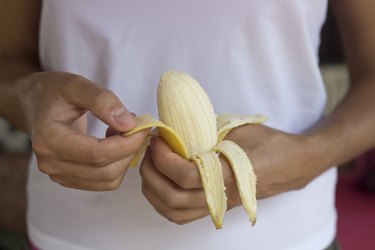
Gas and bloating can be two embarrassing health concerns, but they don't necessarily indicate a problem with your digestive tract. They are typically caused by your dietary and eating habits. Bananas can be puzzling because they boast nutrients and enzymes that help stave off gas and bloating, but also contain starch and fiber, which may promote these digestive woes.
Fight With Fiber
Video of the Day
One medium banana contains 3 grams of fiber, which is 8 percent and 12 percent of the adequate intake for men and women, respectively. Bloating can be a result of constipation, and a high-fiber diet can help prevent constipation by softening your stool and speeding up its progression through your colon. The key is to gradually consume more dietary fiber until your body adjusts. If you rapidly increase your fiber intake, you can cause gas and bloating. Linus Pauling Institute recommends consuming 64 ounces of fluids daily as you increase your fiber intake.
Video of the Day
Regulate With Potassium
The adequate intake of potassium for adults is 4,700 milligrams, and one medium banana contains 422 milligrams, or 9 percent of the AI of this nutrient. The Linus Pauling Institute states a potassium deficiency may lead to constipation. Bloating can be a side effect of constipation. Potassium also balances sodium levels in your body, so if your bloat is caused by a high-sodium diet, bananas can help.
Increase Healthy Intestinal Bacteria
Bananas boast fructooligosaccharides, a type of dietary soluble fiber. FOS go undigested in your body until they arrive at your large intestine. Once there, FOS are fermented by good bacteria, known as probiotics. Consequently, FOS are considered to be a prebiotic. For optimal health, you need to have a balance of good and bad bacteria in your gut. Otherwise, you may experience dysbiosis, a condition that can cause gas and bloating. A review published in 2012 in Current Opinion in Clinical Nutrition and Metabolic Care showed prebiotics can help alleviate stomach bloating.
Eat Ripe Bananas
Bananas have traditionally been recommended for those recovering from bouts of diarrhea. The starch in a banana is hard for your body to digest. Undigested banana attaches to waste in your colon, making it difficult for you to pass stool. To minimize the risk of bananas causing you constipation, eat very ripe bananas. As bananas mature, their starches are converted to sugars that your body easily digests. A study published in 2014 in Pediatric Gastroenterology, Hepatology and Nutrition advised against eating bananas if you are constipated and recommended eating other fiber-rich foods instead.
- Brigham and Women's Hospital: Gas: Beat the Bloat
- USDA National Nutrient Database: Bananas, Raw
- Linus Pauling Institute: Fiber
- Linus Pauling Institute: Potassium
- Fox News: Best and Worse Foods to Avoid Bloating
- The Vegetarian Resource Group: Oligofructose and Fructooligosacchrides (FOS): Derived Mostly From Chicory Root or Cane Sugar
- Women to Women: Digestion and Dysbiosis
- Current Opinion in Clinical Nutrition and Metabolic Care: Intestinal Gas: Has Diet Anything to Do in the Absence of Demonstrable Malabsorption State?
- Pediatric Gastroenterology, Hepatology and Nutrition: Diets for Constipation
Is this an emergency? If you are experiencing serious medical symptoms, please see the National Library of Medicine’s list of signs you need emergency medical attention or call 911.